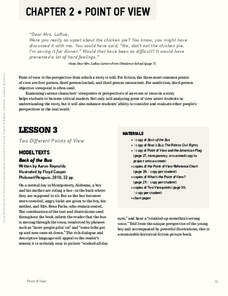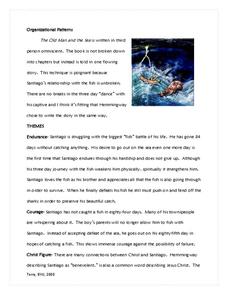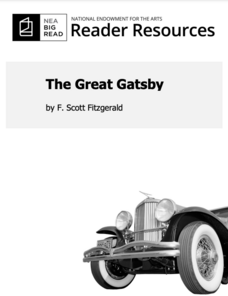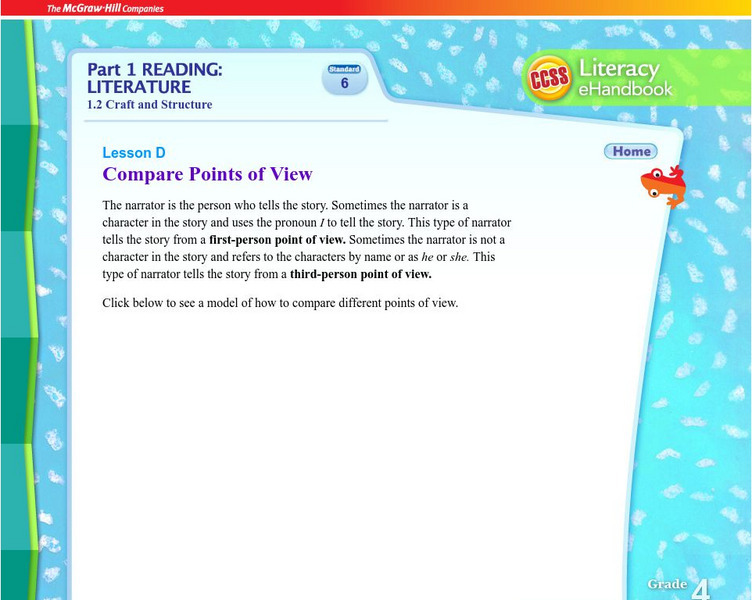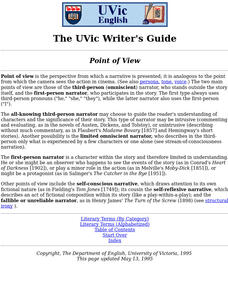Manchester College
What’s Your Point of View?
Work on deciphering the point of view of various pieces of literature. As readers review the concepts of first, second, and third person perspective, they apply what they know to different passages.
K12 Reader
Narrator’s Point of View Flow Chart
How can you tell what point of view a narrator is using, and why does it matter when reading or writing? Use a handy flow chart to determine whether or not your narrator is telling the story from a first or third person point of view.
Scholastic
Point of View
The point of view in a story can dramatically change the story itself. Focus on finding the points of view in various reading passages with a language arts packet, which includes fiction and nonfiction text.
Curated OER
The Metamorphosis: Concept/Vocabulary Analysis
Historically, Franz Kafka's The Metamorphosis has been difficult for many readers to grasp. From the difficult translation issues to the complex plot and themes, the novel's message and story can be lost when learners...
MENSA Education & Research Foundation
Magical Musical Tour: Using Lyrics to Teach Literary Elements
Language arts learners don't need a lecture about poetry; they listen to poetry every day on the radio! Apply skills from literary analysis to famous songs and beautiful lyrics with a lesson about literary devices. As...
Curated OER
The Martian Chronicles: Concept Analysis
If you're planning on including Ray Bradbury's The Martian Chronicles in your science fiction unit, use a concept analysis guide to frame your instruction. It covers literary elements such as setting, narrative voice, and theme, as...
Curated OER
The Old Man and the Sea: Concept Analysis
Use a helpful concept analysis guide when planning your unit on Ernest Hemingway's The Old Man and the Sea. The resource covers plot elements, literary themes, and possible issues to address in order to make the work accessible...
National Endowment for the Arts
Reader Resources: The Great Gatsby by F. Scott Fitzgerald
A handy guide offers high schoolers support as they read the American novel, The Great Gatsby. Complete with a biography of F. Scott Fitzgerald, a timeline of the Roaring Twenties, discussion questions about the novel, and more, this...
Other
Meeting Characters in Literature: Point of View
A very clear explanation of narrator and point of view in literature. Because of the structure of the page and the use of highlighting, upper elementary students should be able to use this to help them understand the concepts, as well as...
Annenberg Foundation
Annenberg Learner: Literature: Exploring Point of View
Use these brief explanations to help you determine the narrator and point of view in any piece of literature. W.11-12.3a Narratives
Curated OER
Mc Graw Hill: Compare Points of View
Read the passages to examine how to compare different points of view then practice on your own.
Grammarly
Grammarly Blog: Consistent Point of View
This Grammarly Handbook resource reminds students how to write with a consistent point of view. Examples are provided to demonstrate how to fix a sentence that contains an inconsistent point of view.
University of Victoria (Canada)
The U Vic Writer's Guide: Literary Term: Point of View
From the University of Victoria's writing tutorial site, this section provides a multiple-paragraph discussion of point of view.
BBC
Bbc Bitesize Revision: Point of View (Narrative Perspective)
This site goes over several tips involved in writing a particular point of view, or narrative perspective, including first person and third person.


